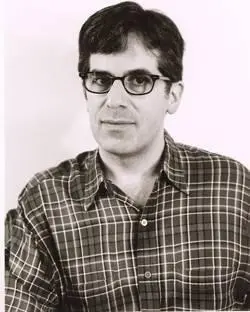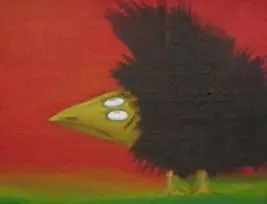This was the winter of my expulsion from Camden College. After Richard Brodeur’s letter, I’d been forced to return to the campus once more, to collect my belongings-books, bedclothes, stereo-all crated in the attic of Oswald House. So Abraham had, in his typical, infuriating, silent way, driven me north, in a borrowed car. The school was closed then, for the long, fuel-conserving winter break. Still, at my insistence, Abraham had waited in the car, while I found a security guard who could unlock the dorm’s attic. I didn’t want my father to set foot on the grounds.
Returning, we’d driven through a Massachusetts blizzard, wind swirling flakes in a tunnel of white around the mole-eye of our windshield. Our silence was total. My shame at Abraham’s presumed disappointment could only be stemmed by stony, preemptive fury of my own. When the storm was at its height, our car inching through the polar cyclone, navigating by the taillights of a wavering truck whose treads ground a path through the slurry, I’d reached into the backseat, into a carton of books and cassettes and, as tonight, pulled out the Eno, and put it into the car’s player. The music made an ideal soundtrack to the blizzard’s unreality. I suppose Abraham was actually struggling with a vivid amount of danger, but Another Green World ’s supernatural placidity seemed to acknowledge his effort and to calm us at the same time. Eno sang I can’t see the lines I used to think I could read between -
Earlier, the first years of high school, when the Clash and Ramones were first thrilling me and Gabriel Stern and Timothy Vandertooth, I’d bring a record home and play it for Abraham and ask him, “Do you hear it? How great it is? There’s never been music like this!”
“Sure,” he’d say. “It’s wonderful.”
“But do you really hear what I’m hearing? Can you hear the same song I do?”
“Of course,” he’d say, leaving me perfectly unsatisfied, leaving the mystery unplumbed: Could my father hear my music? By my college years, though, I’d never have asked, even if we weren’t on that dour voyage home. Those lines of inquiry were shut down, so I barely troubled to speculate what Another Green World might mean to Abraham, whether he felt it shaping our pummel through the snow. Eno sang, You’d be surprised at my degree of uncertainty -
I considered now that what I once loved in this record, and certain others- Remain in Light , “O Superman,” Horses -was the middle space they conjured and dwelled in, a bohemian demimonde, a hippie dream. And that same space, that unlikely proposition, was what I’d eventually come to hate and be embarrassed by, what I’d had to refuse in favor of soul, in favor of Barrett Rude Junior and his defiant, unsubtle pain. I’d needed music that would tell it like it is, like I’d learned it to be, in the inner city. Another Green World was like Abraham’s film: too fragile, too yokeable-I wanted a tougher song than that. I knew stuff B. Eno and A. Ebdus didn’t, and I couldn’t afford to carry them or their naïveté, any more than Mingus could afford to carry me or mine.
The collapsing middle was what Running Crab had fled out of. It was the same space the communists and gays and painters of celluloid imagined they’d found in Gowanus, only to be unwitting wedges for realtors, a racial wrecking ball. A gentrification was the scar left by a dream, Utopia the show which always closed on opening night. And it wasn’t so different from the space Abraham raged not to find opening to welcome his film, a space the width of a dwindled summer, a place where Mingus Rude always grooved fat spaldeen pitches, born home runs.
We all pined for those middle spaces, those summer hours when Josephine Baker lay waste to Paris, when “Bothered Blue” peaked on the charts, when a teenaged Elvis, still dreaming of his own first session, sat in the Sun Studios watching the Prisonaires, when a top-to-bottom burner blazed through a subway station, renovating the world for an instant, when schoolyard turntables were powered by a cord run from a streetlamp, when juice just flowed . I’d come to Indiana not to see a typewriter, or meet Croft, but to walk that back road in dusk and see the middle space the Watermelon Sugars had wrested from the world, before the makers of highways wrested it back, just as I’d gone to Katha’s house to see the pallet she kept for her sister, to hear M-Dog’s rhymes. A middle space opened and closed like a glance, you’d miss it if you blinked. Maybe Camden had been one once too, before it was poisoned with cash. It bore the traces. In the same spirit, on Rachel’s principles, I’d been pushed out like a blind finger, to probe a nonexistent space, a whiteboy integrating public schools which were just then being abandoned, which were becoming only rehearsals for prison. Her mistake was so beautiful, so stupid, so American. It terrified my small mind, it always had. Abraham had the better idea, to try to carve the middle space on a daily basis, alone in his room. If the green triangle never fell to earth before he died and left the film unfinished, it would never have fallen-wasn’t that so? Wasn’t it?
Brian Eno sang How can moments go so slowly? as we drove through the storm. Abraham and I let ourselves be swept through the blurred tunnel, beyond rescue but calm for an instant, settled in our task, a father driving a son home to Dean Street. There was no Mingus Rude or Barrett Rude Junior with us there, no Running Crab postcard or letter from Camden College pushed through the slot. We were in a middle space then, in a cone of white, father and son moving forward at a certain speed. Side by side, not truly quiet but quiescent, two gnarls of human scribble, human cipher, human dream.
Just Walking in the Rain by Jay Warner, unread by D. Ebdus, is a responsible account of the Prisonaires.
“It Was the Drugs,” lyrics by Chrissie McClean.
Among too many to thank, I must at least mention Elizabeth Gaffney, Lynn Nottage, Sarah Crichton, David Gates (the man in the abandoned house), Christopher Sorrentino, Lorin Stein, Julia Rosenberg, Walter Donohue, Zoë Rosenfeld, Bill Thomas, Richard Parks, and Yaddo.
Above all, Christina Palacio, Karl Rusnak, Dione Ruffin, and my brother, Blake.

Jonathan Lethem is the author of six novels, including the bestsellers THE FORTRESS OF SOLITUDE and MOTHERLESS BROOKLYN, which won the National Book Critics Circle Award. He is also the author of two short story collections, MEN AND CARTOONS and THE WALL OF THE SKY, WALL OF THE EYE, and a collection of autobiographical essays, THE DISAPPOINTMENT ARTIST. His stories and essays have appeared in The New Yorker , Rolling Stone , Esquire , McSweeny's , Tin House , The New York Times and others. He was recently granted a MacArthur Genius Award. He lives in
***















